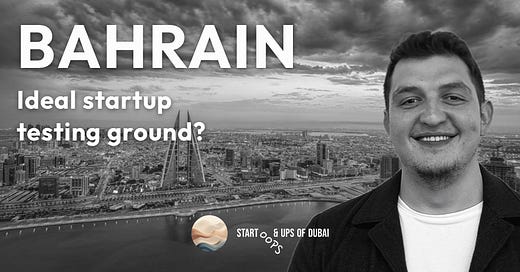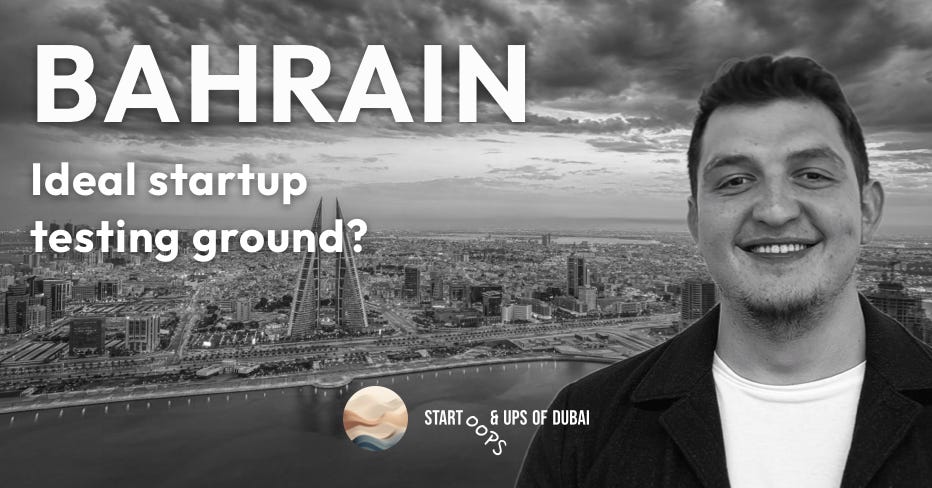Is Bahrain the ideal Testing Ground for startups?
Do you know what’s a Venture Studio and what’s making them successful?
In this interview, I’m talking with Egemen Eres, Senior Product Lead with experience from Venture Studios in both Dubai and Bahrain.
We’re talking about the differences when building a startup in the UAE vs Bahrain, about VC funding, pitch slapping and more.
Enjoy the interview!
What context do I need to know about you to understand your background and journey?
I’m a product leader at Spring Studios in Bahrain.
I started in FMCG with Unilever, unintentionally doing product management while working on IT projects. Later, I led a mobile app build at Nestle in Turkey and joined Papara, a FinTech unicorn.
Coming from a corporate background, I always wanted to build things from scratch, so startups and venture builders appealed to me.
I feel lucky to have worked with or mentored over 150 founders throughout my journey.
How would you compare the startup scenes you’ve experienced in Dubai and now in Bahrain?
Dubai is competitive, with many big players, making it tough for new startups. Bahrain, though smaller, is ideal for testing ideas. If something works there, it can scale to larger markets like Saudi Arabia or the UAE.
Bahrain’s market is more representative of the Middle East, with active local population and easier entry for startups looking to validate and grow.
We see mainly fintech and e-commerce startups in the UAE. Is Bahrain the same?
I believe fintech will remain a key focus across the region. Generative AI is here to stay, but only startups solving real problems will thrive, whether in Dubai, Bahrain, or globally.
You mentioned founders message you a lot, sharing their pitch decks, even when it’s not relevant. On the contrary, what’s the best startup pitch you’ve ever received?
Pitch slapping is a thing - people just share their pitch deck with the number they’re raising, often not considering if I’m the right contact.
The best pitch I’ve seen was from a mom creating toys to boost toddlers’ cognitive development. She stood out by joining Pilates and yoga classes for pregnant women and connected with over 100 moms through WhatsApp groups to sell directly.
I think Peter Thiel once said: “The most successful founders are those who solve a problem they themselves have.”
The problem statement slide is the most important one. Is the problem significant enough for people to pay for? Is the market big enough?
What would you recommend to founders who are on the fundraising journey in the Gulf region?
Expect to receive a lot of no’s and unresponsiveness; it’s tough. Don’t give up—keep going.
Also, research the funds you’re approaching. Older funds have set criteria and larger portfolios, making them harder to access. Younger funds are often more open to various industries and have a higher risk appetite, so targeting them can boost your chances.
Founders often seek VC funding as validation for their ideas. Who do you think VC investment is really for?
VC funding isn’t necessarily an accomplishment; it’s more of an obligation.
When you raise money, you’re inviting someone to influence how you run your business. VCs look for high-return investments, expecting 5 to 100 times their money back in a few years. If your model isn’t about rapid growth, VC funding may not be for you.
If you want to build a sustainable business with a small team and consistent revenue, that’s perfectly fine. There’s no right or wrong approach; it all depends on your goals. If you can keep 100% ownership, consider it a luxury and go for it.
Can you tell me why you are bullish about the venture studio approach and who you think it’s for?
I’m a data guy, so here are some stats: studio-backed startups have a 30% higher success rate and a 44% better chance of securing funding compared to traditional startups.
They also reach Series A funding 55% faster. That’s why I believe it’s a recipe for success for many founders trying to build.
What would you wish for founders to do more of?
Execute. There’s a quote: “The founder that can actually execute, pivot, and distill the signal from the noise is one in a hundred, maybe one in a thousand.”
Ideas don’t build startups; execution does.
You also have your newsletter, Scalable—tell me more about it!
I started Scalable because I noticed many resources focus more on selling than on helping. With many startups failing to achieve product-market fit, I wanted to share insights from my experience in launching products.
Scalable is a weekly newsletter with a 0% free policy at this time.
Anything more you’d like to add?
For anyone building an AI startup, remember: “No one buys a donut for the sprinkles.” If you’re implementing AI just for the sake of it, chances are no one will buy your product.
Thanks Egemen for this chat!
Kristina
🔗 Connect with me on LinkedIn - Kristina Melsova.
👉🏻 Get my guides, resources and tips to start your business in Dubai.
👉🏻 500 AED off Meydan FZ business license with my referral (email kristina@melsova.com to avail - I’m their happy customer)





